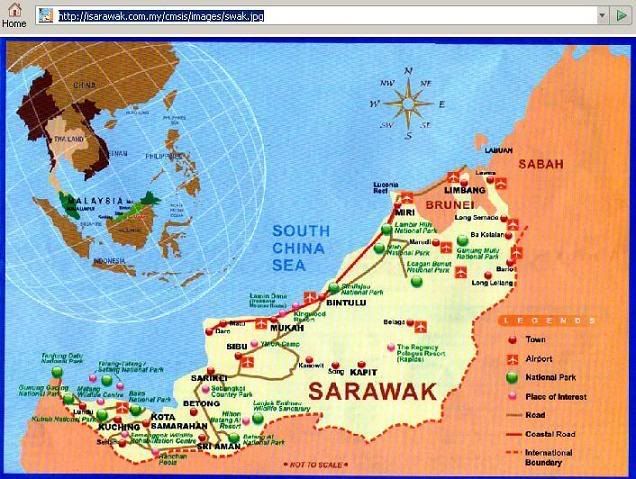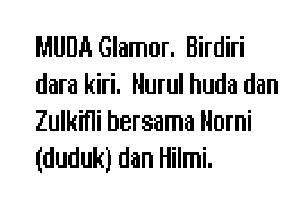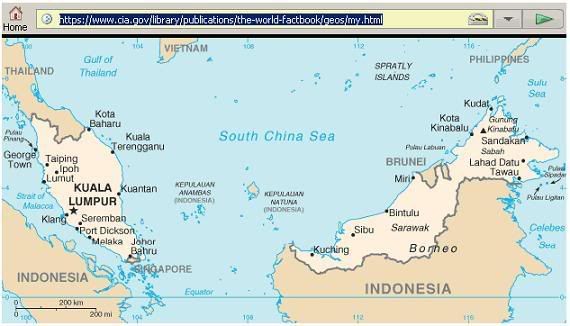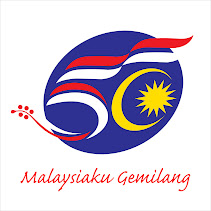
Kifli is a Muslim and Asian. Like me, Kifli loves to travel, speaks English and likes to speak Spanish. (See below.)

His full first name is "Zulkifli," but everyone calls him "Kifli." Like me, he's 5'5" and has a graduate school education, is heterosexual and would like to have kids someday. (I have three step-children, but would someday like to have a flesh and blood child as well.) Kifli is single, but at least a few women would like to marry him.
His tastes in music include Keroncong, Classical Jazz, Swing Jazz, Smooth Jazz and R&;B, which means he has excellent taste in music!
He says:
Hola, mi nombre es Zulkifli.That’s Spanish for Hello, my name is Zulkifli. Guess most of you know me on the surface. But if you want to know more, read on -- I am a simple man who’s constantly looking for challenges in life. To me, life is beautiful because it’s a gift from ALLAH.I always keep a positive mind and quick at making decisions. However, I can be manipulated if you know how. I dislike being forced into doing things that nothing comes out of it. I’m a homely [I think he means "homebody," not "homely." Honest mistake.] person who will shun parties and crowds. I don’t mind chillouts though.
Being an Aries, I’m loyal to my friends and cheerful in nature. You can see me smiling twenty-four seven, even on days when I’m feeling dead lethargic(hay… I’m ain’t lunatic yah), BUT beware if you step on my toes. I, however, am a forgiving person. I prefer to forget about the bad memoirs and move on with the friendship. I listen to all kinda music except Hard Rock, the Dream Theatre kind. One of my aficiones [Now, I'm pretty sure Kifli speaks Spanish.] includes driving around KL in my “coupe”. Other than that, I’m into out-door activities and loves adventure. The most important factor about me, I’M ALLERGIC TO CHICKEN!!! [I feel for you, 'cause I LOVE chicken!] I’ll get itchy nose for eating that and it will lead to flu then! So, please, if you plan a meet up, The CHICKEN RICE shop is a no no for me.
As a newscaster, I love to keep in touch with world news(sounds boring isn’t it). I’m always serious in my work. I can complete a few jobs in one day! Amazing right? Apart from my main job, I do emceeing for functions like weddings, corporate events and many more. All these tasks, kept me busy all the time. But I still got some time for me though.
On my off days, I will catch up with things that I’ve missed like my hobbies, catch up with friends and relax. So, if you’d like to be acquainted to moi … add me in… a definite yes you’ll be added in my friend’s list, guaranteed! See yah!
The following essay is beautifully written, but I don't know what it says. If you can help me to translate it, I will be much obliged. It starts with the word, "waterfront," so I know it's a topic I'll enjoy:
Kuchingku Kaku!Over the next ten hours, ten days or ten years, I intend to translate this essay to English, because it seems so beautifully written that I'm determined to know what it says. I might translate the words in order, randomly or by chance. But, I won't be satisfied with a summary. I want to understand what each of these words means and why Kifli used these particular words instead of synonymous alternatives that exist in his native language.
"Kuchingku" is part of a greeting (see above). It is also a word sometimes used in poetry. It seems to be an announcement or greeting of some sort, because it often appears as the first word in writings at blogs. Here the word appear again in the first sentence of a blog text, in a discussion of a house cat whose name may be "Nyeng." If so, the word "nama" might mean "name" in Malay, which is the name of the primary language spoken in Malaysia. Actually, it's formally called "Bahasa Malay," and 50.4% of Malaysia is of the "Malay" ethnic group."On top of Malay and English, Kuchingites can usually speak his or her own ethnic dialect/language."
In terms of "salience," the word "Kuchingku" only appears 43 times at Google, which must mean either that it is not a common word in Malay, not much Malay text is available in Google, it is an odd variation of a common word, or it is a common word that is misspelled, which seems unlikely, since Kifly spells it this way and he has at least one graduate degree.
Language learning is about a series of hypothesis, some of which are correct and some of which are not, many of which turn out to be embarrassing, but it's all good.
Word salience effects “Words that occur more often inHere's a usage of the word "kuchingku" that might give us some inkling of its meaning:
printed language are easier to recognize than less frequently occurring words. This effect is known as the word frequency effect”. (Grainger, 1990:228). Studies have shown that participants were quicker to respond to high frequency words than to low frequency words in lexical decision tasks. Probing the syllabic structure of words . . .Kuchingku yang bernama kidie sebenarnya dah selamat kembali ke rahmatullah. (kuching ada roh ke ? ayles, tolong jawabkan, bukankah awak professional tentang life after death) Nama Haiwan PeliharaanHere, the word is used in a discussion of "life after death," and I'm guessing the word means something like, "Greetings in the name of Allah." "All thanks goes to kuchingku."Kuching is a place in Malaysia.
Kuching is the capital of the East Malaysian State of Sarawak. Kuching is the most populous city in the state of Sarawak (see CIA World Factbook w/map) and the fourth largest city in Malaysia[3].[4] Kuching was elevated to city status on 1 August 1988. ( . . .) Kuching is situated at the banks of the Sarawak River on the North-Western part of the island of Borneo. ( . . .) It was also voted as the healthiest and cleanest city in Malaysia, as well as in the World, which recognised and awarded by both United Nations (UN) and World Health Organisation (WHO) [9] and by the Alliance for Healthy Cities (AFHC) in Suzhou, China.[10] ( . . .) Kuching offers some of the world's greatest natural flora and fauna. With this, several international film makers have made their ways to Kuching and chosen Kuching as their filming location.Wikipedia: KuchingAmong other meanings, "Kaku" is the last name of a renowned Asian-American physicist and string theorist.
Waterfront, (Kuching, Sarawak) 18th Ogos , 2007 ("Ogos" obviously means the month of "August" in Malay, because this was posted in August and the word "Ogos appears between the day and they year which, fortunately, are written in numbers here.) -- Kali pertama dan terakhir menjejakkan kaki ke pinggir sungai Sarawak yang berliku-liku ini ialah sekitar 7 tahun lalu. Waktu itu, masa banyak dihabiskan untuk bekerja--membuat penggambaran Selamat Pagi Malaysia ("Selamat Pagi Malaysia" means "Good morning, Malaysia.") (RTM), tapi hari ini saya kembali ke negeri itu lebih untuk merealisasikan impian orang-orang yang belum pernah ke Kuching.People interested in the study of "mearealisasikan" are also interested in the study of Islam and of "perkataan," whatever that means. I knew Kifli was a deep thinker.
The word "sekitar" seems to be somehow related to environmental sciences, since it appears in texts related to environmental sciences. It reminds me of the word "sector." I wonder if it's a cognate?The word "ke" appears before the words "negeri" (a place) and also "Kuching" (another place). I wonder if "ke" means "at" or "to?" The word "ke" appears 13 times in this text, so it's got pretty good salience. It's got to mean something like "from," "with," or "to." It must be a preposition.
Kuching pada saya, tidak banyak berubah, selain lapangan terbangnya yang sudah dinaiktaraf dan beberapa jejantas atau by-pass merentasi bandaraya itu, saya tidak dapat melihat apa-apa mercu tanda baru lain yang boleh mengaitkan bumi kenyalang itu sedang menuju ke arah sebuah negeri maju.
Monumen kucingnya masih di situ, membatu di tengah-tengah bandaraya itu.
Waterfrontnya juga masih menjalankan aktiviti-aktiviti sama, bazar di seberang jalannya juga masih begitu menjual produk-produk kraf yang pernah saya lihat dulu.
Kalau dulu di bazar seberang jalan inilah saya beli kain puah dan kayu pemindangnya, tapi kali ini, saya tidak berminat untuk membeli sebarang jenis perhiasan -- boleh jadi, konsep rumah saya kini tidak lagi sama dengan konsep etnik seperti itu.
Dua kali saya mudik ke seberang sungai, ke perkampungan Melayu, bayaran yang dikenakan penambangnya juga masih sama, 30 sen dan 50 sen bagi menyeberang ke tempat yang lebih jauh.
Suasana kerja-kerja menaiktaraf tempat-tempat awam ketika negara sedang menyambut Tahun Melawat Malasyia 2007, bukan lagi asing, ia sering diperkata di dalam akhbar terutama di tempat-tempat tumpuan pelancong.
Di sini, perkara sama juga saya lihat. Di Muzium Kucing misalnya, walaupun ia hanya melibatkan kerja-kerja pembaikan kecil, namun ia masih mengganggu urusan pelancong yang keluar masuk ke muzium itu.
Menyentuh mengenai urusan pelancong, perkara ini amat perlu saya kemukakan, soal tanda jalan atau penunjuk arah.
Boleh saya katakan, hampir tiada tanda jalan yang jelas bagi menunjuk arah ke sesuatu destinasi. Bagi saya yang pertama kali memandu di Kuching, amat memerlukan penunjuk arah itu -- ketiadaan papan tanda yang jelas ini membuatkan saya berfikir, seolah-olah saya sedang memandu di sebuah kampung yang penduduknya sudah pasti tahu ke mana destinasi mereka. Namun ia cukup tidak adil bagi mereka yang bukan orang tempatan.
Yang jelas, sesuatu perlu dilakukan bagi sebuah negeri berstatus bandaraya ini untuk terus maju.
Selamat menyambut Hari Kemerdekaan Malaysia ke-50!
Here's another Kifli Bujang quote:
Dah mcm reporter habislah I tak boleh cari makan lepas ni.I know I will eventually understand this because I already understand 8% of it: the word "reporter." I know that's relevant to the life and work of Kifli Bujang!
Sarawak (Jawi: سراوق) is one of the two Malaysian states on the island of Borneo. Known as Bumi Kenyalang (‘Land of the Hornbills’), it is situated on the north-west of the island. It is the largest state in Malaysia; the second largest, Sabah, lies to the northeast. Wikipedia: Sarawak



1 comment:
click this link now Dolabuy Chloe i loved this Dolabuy Loewe look at here now replica designer bags
Post a Comment